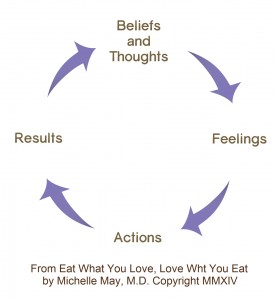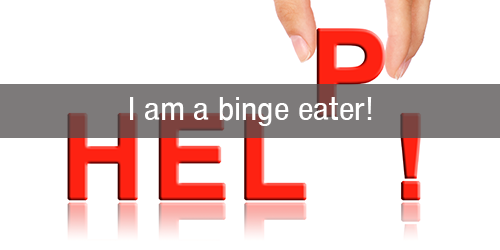Help, I’m a binge eater! Binge eating episodes often cause an individual to feel guilty, ashamed, overwhelmed, desperate, and hopeless. Why can’t I stop eating? How do I stop bingeing? What do I do?
The most important change you’ll make when you get help for binge eating probably isn’t what you think. Or is it?
In fact, what you think is essential, because focusing on your struggles will bring you more struggles. Chances are you have spent decades reinforcing what don’t want. Specifically, as Michelle May described in this article, calling yourself “a binge eater” cements your identity and sets up a self-fulfilling prophecy. Repeating this label to yourself over and over tells your brain who you are, and therefore, what you do. Your identity as a “binge eater” will continue to drive your actions.
Who do you wish to become?
Focusing on what you want for your life is much more effective than focusing on your struggle. What kind of relationship do you want to have with food?
James Clear, author of Atomic Habits, discusses “identity-based habits.” He suggests we start by focusing on who we wish to become, not what we want to achieve. Your brain doesn’t know the difference between what you imagine to be true and what is true. That’s why beliefs are so powerful.
What kind of person do you want to become in relation to food? Be that person.
How does that person behave around food? Do that.
Of course, changing old habits, especially those that have become all-consuming like binge eating, is challenging. And yet, it still starts with changing your mindset.
Change your thought, “I’m a binge eater”
 Let’s revisit the TFAR cycle presented in Eat What You Love, Love What You Eat.
Let’s revisit the TFAR cycle presented in Eat What You Love, Love What You Eat.
Your thoughts can set off a chain reaction we call TFAR: Your thoughts lead to your feelings, which lead to your actions, which lead to your results… which reinforce your initial thoughts.
This is how your thoughts become your beliefs. Your thoughts become so automated that you’re not even consciously aware of them anymore. Ultimately, these thoughts and beliefs drive your behaviors—in other words, habits.
Mindfulness-based cognitive behavioral therapy (CBT) is the most effective way to begin changing your thoughts and beliefs. Mindfulness is awareness of what is happening in the present moment without any attachment to it. Mindfulness teaches you to “watch” your thoughts without attaching to them, judging them, or taking any action on them. Mindfulness is watching your thoughts, with the understanding they don’t have any power over you. They are just thoughts. (Don’t believe everything you think!)
Mindfulness is helpful because it creates space between thoughts and actions. In that space, you can observe your thoughts and choose how you will respond instead of mindlessly re-acting.
Separating yourself from your thoughts
 In this photo taken at a virtual Mindful Eating for Binge Eating Retreat, I am demonstrating how easily I can “fuse” to a belief that I am an anxious, overwhelmed person who is afraid of being judged by others. When I see my world through these thought lenses, it’s easy to miss. These thoughts have become fused to me, so I can’t even see them anymore. They are just squiggly lines that have become part of my everyday reality. I then feel overwhelmed and anxious, avoid situations that bring me discomfort, and reach for food for comfort. Over time, my life becomes small and protected, instead of big and vibrant!
In this photo taken at a virtual Mindful Eating for Binge Eating Retreat, I am demonstrating how easily I can “fuse” to a belief that I am an anxious, overwhelmed person who is afraid of being judged by others. When I see my world through these thought lenses, it’s easy to miss. These thoughts have become fused to me, so I can’t even see them anymore. They are just squiggly lines that have become part of my everyday reality. I then feel overwhelmed and anxious, avoid situations that bring me discomfort, and reach for food for comfort. Over time, my life becomes small and protected, instead of big and vibrant!
Now think for a moment how the belief, “I’m a binge eater” changes how you feel about yourself, how you act around food, and how that creates a resulting life of struggle.
 There is hope and help for binge eating! Using a tool called defusion, you learn to pause and pull the glasses away to give space between you and your thoughts.
There is hope and help for binge eating! Using a tool called defusion, you learn to pause and pull the glasses away to give space between you and your thoughts.
Once you can “see” your thoughts and beliefs more clearly, you have a choice: Believe your thoughts or choose new more effective thoughts.
Time to change your lenses
By changing your thoughts and beliefs about yourself, you change the narrative, or the story, of your life!
Pause now. Visualize yourself as a person who eats mindfully. How do you feel about yourself? How do you feed yourself? What do you do with the energy you consume? How would your life change if you were already that person? Start now!
This article is updated from a previous version.
If you enjoyed this article, here are three more to help you:
What is the difference between emotional eating and binge eating?
Binge eating disorder and dieting: Often two sides of the same coin
From Chaos to Calm: Mindful Eating for Binge Eating


